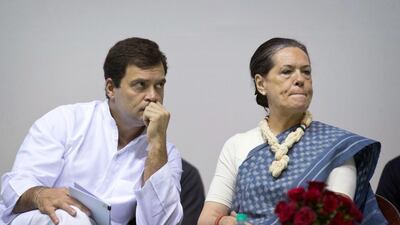NEW DELHI // The headquarters of India’s Congress party wears a deserted air these days. Gone are the supplicants from far-flung towns seeking favours. Gone are the hundreds of party workers who shouted slogans as leaders walked into the white colonial-era bungalow in the heart of New Delhi.
The 131-year-old party has led India for nearly three-fourths of its modern history but is foundering after a string of electoral defeats. Several senior members have quit, accusing the party leadership of failing to connect with the masses.
Two years after its spectacular defeat by prime minister Narendra Modi’s Hindu-nationalist Bharatiya Janata Party in national elections, the Congress party’s strength in the powerful lower house of parliament has dropped from 206 seats in 2009 to just 44 today, its lowest number ever, and it holds power in just six of India’s 29 states, down from 13 only three years ago.
Blame is increasingly falling on one person: Rahul Gandhi, the 46-year-old scion of the family that has dominated Congress for a century, and who just two years ago was being touted as a future prime minister.
He has been an MP since 2004, but Mr Gandhi, whose father, grandmother and great-grandfather were all prime ministers, still comes across as a reluctant heir lacking the smarts to pull the party out of what seems like a terminal decline.
Amid speculation that he will soon take the party’s reins from his mother, Sonia, many supporters say it is time for new young leaders to push aside the Nehru-Gandhi dynasty.
“The party is facing dozens of mutinies and rebellions in different states and you need strong leadership to stem the tide of defections,” said Zoya Hasan, a political analyst at New Delhi’s Jawaharlal Nehru University.
That leadership was unlikely to be provided by Mr Gandhi, she said.
“Twelve years is a long time in politics to show the spark that is needed for dealing with very powerful rivals,” said Ms Hasan. “Rahul Gandhi has not shown it.”
Meanwhile, some analysts say Modi’s oft-repeated slogan of a “Congress-free India,” and his party’s goal to crush the party, does not bode well for the secular foundations of the country.
The rise of right-wing Hindu nationalist forces across India, strengthened by Mr Modi’s political successes, makes the existence of the traditionally secular, liberal parties such as the Congress even more imperative, Ms Hasan said.
“Despite all its limitations, the Congress party represents a liberal tendency which can do with some reinforcement,” she said.
But the Congress leadership has shown few signs of attempting to fix what ails it.
“There seems to be no visible, credible plan for recovery. There does not seem to be any meaningful introspection either,” said Sandeep Shastri, a Bangalore-based analyst with the Lokniti Programme for Comparative Democracy.
“Every time the Congress has lost, the party says the loss is a collective responsibility. But when the party wins, it’s solely due to the party high command,” and the glory goes to the Gandhis, Mr Shastri said.
The party often seems incapable of seeing a future outside of the Gandhi family.
As grumbling has grown about Rahul Gandhi, and his inability to shed his upper-class pedigree as he tries to reach out to poor voters, there have been increasing calls for his more charismatic sister, Priyanka Gandhi Vadra, to become the party’s face, though neither she nor her family have revealed her plans.
There is a clamour among the ranks for Mrs Vadra to lead the Congress in elections next year in Uttar Pradesh, in India’s most populous state that has traditionally served as a bellwether for national elections, with the next due in 2019.
Though other Congress members unrelated to the Gandhis could rise, the family has a powerful support base, especially among older party leaders.
The party has a long-held culture of deferring to older colleagues, most of whom are loyal to Rahul’s mother, Sonia, the Italian-born widow of former prime minister Rajiv Gandhi. Better educated and more articulate younger members who show leadership qualities are viewed with suspicion by older entrenched leaders.
Younger leaders are more plugged into India’s growing economic trajectory, pushing for faster economic reform and pro-market policies. Many older leaders belong to a generation that came of age soon after the country gained independence from Britain and subscribe to what are widely viewed as stodgy socialist values.
Lately, Rahul Gandhi’s elevation to the top party job appeared even closer. His mother, who has been hospitalised with an unidentified medical condition more than once in the past few years, collapsed last week during a political rally and had to be flown to hospital.
Many party leaders view his ascension as a given, and say he bears no blame for the party’s current troubles.
“Rahul Gandhi is not the president of the party. He is the vice president. Therefore, there are constraints on what he can do, and how he can do it,” said Mani Shankar Aiyer, a senior Congress leader. “I fully expect Rahul to come into his own only when he becomes the president of the party.”
Even critical political analysts say it is too early to write off the Gandhis or the Congress, which remains the only party likely to offer a viable alternative to the BJP. Congress defectors have largely gone to regional parties in their home states.
“Even though the Gandhis have not been delivering victories, the party is still dependent on them for survival,” said Ms Hasan.
* Associated Press

